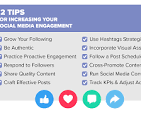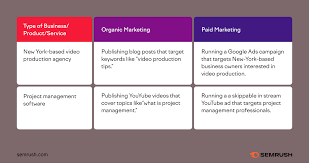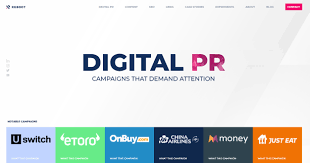Maximising Engagement: Strategies to Increase Social Media Reach
How to Increase Social Media Engagement
Social media has become an essential tool for businesses to connect with their audience, build brand awareness, and drive traffic to their websites. To make the most out of your social media presence, it’s crucial to increase engagement with your followers. Here are some effective strategies to boost social media engagement:
Create Quality Content
Quality content is key to engaging your audience on social media. Share relevant and valuable posts that resonate with your followers. Use a mix of images, videos, infographics, and text-based posts to keep your feed interesting and diverse.
Encourage Interaction
Encourage interaction by asking questions, running polls or surveys, and seeking feedback from your followers. Respond promptly to comments and messages to show that you value their input and engagement.
Use Hashtags Wisely
Hashtags can help increase the visibility of your posts on social media platforms. Research trending hashtags in your industry and use them strategically in your posts to reach a wider audience.
Collaborate with Influencers
Partnering with influencers in your niche can help you reach a larger audience and boost engagement on social media. Identify influencers whose values align with your brand and collaborate on campaigns or sponsored posts.
Run Contests and Giveaways
Contests and giveaways are great ways to incentivise engagement on social media. Encourage followers to like, share, or comment on your posts for a chance to win prizes or discounts.
Analyse Performance Metrics
Monitor the performance of your social media campaigns using analytics tools provided by platforms like Facebook Insights or Twitter Analytics. Analyse key metrics such as reach, engagement rate, and click-through rate to understand what content resonates best with your audience.
By implementing these strategies consistently, you can increase social media engagement, strengthen relationships with your followers, and ultimately drive business growth through effective social media marketing.
Six Advantages of Expanding Social Media Presence for Business Growth
- Enhances brand visibility and awareness among a wider audience.
- Facilitates direct communication with customers for better engagement and relationship-building.
- Allows for targeted advertising to reach specific demographics and interests.
- Provides valuable insights through analytics to measure performance and improve strategies.
- Boosts website traffic by directing users to your site through social media posts.
- Increases opportunities for collaboration with influencers and other brands for mutual benefit.
Challenges of Expanding Social Media: Navigating Competition, Criticism, and Impact Measurement
- 1. Increased competition for audience attention
- 2. Risk of negative feedback or criticism going viral
- 3. Potential for information overload for followers
- 4. Time-consuming to maintain active social media presence
- 5. Difficulty in measuring the direct impact on business outcomes
Enhances brand visibility and awareness among a wider audience.
Increasing social media engagement enhances brand visibility and awareness among a wider audience. By actively engaging with followers, sharing valuable content, and leveraging social media platforms effectively, businesses can reach a broader demographic and increase their brand’s presence in the digital landscape. This heightened visibility not only helps in attracting new customers but also reinforces brand recognition and credibility among existing followers, ultimately contributing to long-term brand growth and success.
Facilitates direct communication with customers for better engagement and relationship-building.
Utilising social media platforms enables businesses to establish direct communication channels with their customers, fostering better engagement and relationship-building opportunities. By engaging in conversations, responding to queries, and addressing feedback in real-time, businesses can create a more personalised and interactive experience for their audience. This direct interaction not only enhances customer satisfaction but also helps in building trust and loyalty, ultimately leading to stronger relationships with customers.
Allows for targeted advertising to reach specific demographics and interests.
One significant advantage of increasing social media presence is the ability to utilise targeted advertising to reach specific demographics and interests. By leveraging the detailed user data available on social media platforms, businesses can create highly tailored ad campaigns that resonate with their desired audience. This targeted approach not only increases the effectiveness of advertising efforts but also helps in maximising ROI by reaching those most likely to engage with the content or make a purchase.
Provides valuable insights through analytics to measure performance and improve strategies.
One significant advantage of increasing social media presence is the ability to gain valuable insights through analytics to measure performance and enhance strategies. By utilising analytics tools provided by social media platforms, businesses can track key metrics such as engagement rate, reach, and click-through rate. These insights enable companies to understand what content resonates best with their audience, identify trends, and make data-driven decisions to improve their social media strategies. By leveraging analytics effectively, businesses can optimise their social media efforts, target the right audience, and achieve better results in their marketing campaigns.
Boosts website traffic by directing users to your site through social media posts.
One significant advantage of increasing social media engagement is the ability to boost website traffic by directing users to your site through engaging social media posts. By sharing compelling content, promotions, and links on your social media platforms, you can attract followers’ attention and encourage them to click through to your website. This increased traffic not only enhances your online visibility but also provides valuable opportunities to convert visitors into customers or leads. Effective social media strategies can drive targeted traffic to your site, ultimately contributing to improved brand awareness and business growth.
Increases opportunities for collaboration with influencers and other brands for mutual benefit.
Increasing social media engagement opens up new opportunities for collaboration with influencers and other brands, leading to mutual benefits. By actively engaging with your audience on social platforms, you can attract the attention of influencers who align with your brand values and target audience. Collaborating with influencers can help expand your reach, increase credibility, and drive more engagement. Furthermore, partnering with other brands on social media can create synergies that allow both parties to tap into each other’s audiences, leading to shared success and increased brand visibility. Overall, leveraging social media engagement for collaborations presents a valuable opportunity to amplify your brand’s presence and achieve mutual growth.
1. Increased competition for audience attention
As businesses strive to increase their social media presence, one significant con they may face is the heightened competition for audience attention. With more companies vying for the same audience on social media platforms, it becomes increasingly challenging to stand out and capture the attention of users. The saturation of content can lead to a diluted impact of individual posts and campaigns, making it harder to engage with and retain followers amidst the sea of information bombarding users on their feeds. This increased competition underscores the importance of creating unique, high-quality content that resonates with the target audience to cut through the noise and make a lasting impression.
2. Risk of negative feedback or criticism going viral
One significant drawback of increasing social media engagement is the risk of negative feedback or criticism going viral. In today’s digital age, a single negative comment or post has the potential to spread rapidly across social media platforms, damaging a brand’s reputation and credibility. Even with stringent moderation and proactive response strategies in place, it can be challenging to control the narrative once negative feedback gains traction online. Businesses must be prepared to address criticism promptly and transparently to mitigate the impact of any potentially damaging content circulating on social media.
3. Potential for information overload for followers
An inherent drawback of increasing social media engagement is the potential for information overload for followers. With a surge in content being shared on various platforms, followers may find themselves inundated with a constant stream of posts, updates, and notifications. This overload can lead to fatigue and disengagement, as followers struggle to keep up with the sheer volume of information vying for their attention. As a result, businesses need to strike a delicate balance between staying active on social media and ensuring that they do not overwhelm their audience with excessive content, which could ultimately dilute the impact of their messaging.
4. Time-consuming to maintain active social media presence
Maintaining an active social media presence can be a significant con due to its time-consuming nature. Consistently creating and curating content, engaging with followers, monitoring analytics, and staying updated with trends require a considerable investment of time and effort. For businesses with limited resources or competing priorities, dedicating the necessary time to effectively manage social media accounts can be challenging. This can lead to inconsistent posting schedules, decreased engagement, and missed opportunities for connecting with the target audience. Balancing the demands of maintaining an active social media presence alongside other business activities can be a daunting task that requires careful planning and resource allocation.
5. Difficulty in measuring the direct impact on business outcomes
One significant drawback of increasing social media engagement is the difficulty in measuring the direct impact on business outcomes. While social media metrics such as likes, shares, and comments provide valuable insights into audience engagement, it can be challenging to attribute these interactions directly to tangible business results such as sales or revenue. This lack of clear correlation between social media engagement and bottom-line outcomes can make it harder for businesses to justify their investment in social media marketing efforts and accurately assess the return on investment. As a result, businesses may struggle to determine the true effectiveness of their social media strategies in driving meaningful business growth.









